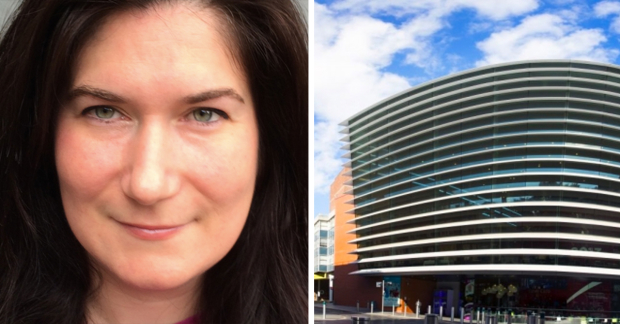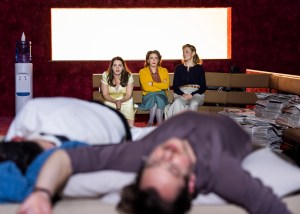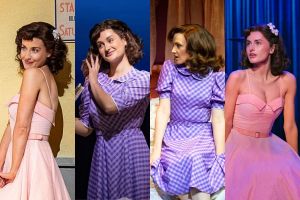Julia Thomas: Theatre for young people and their families is crucial for our sense of wellbeing
As their week guest editing at WhatsOnStage continues, Curve Leicester’s Nikolai Foster and Chris Stafford invite director Julia Thomas, overseeing the venue’s family show ”Giraffes Can’t Dance” to discuss the value of theatre for all ages

When you talk about making theatre for young people, you often hear comments like "it's important because this may be their first experience of theatre". This is obvious – the first of what we do is vital in shaping our future relationship to it. But we also have to continue asking why theatre is important to us, at every stage of our lives. What's the point in being introduced to it if it's not going to matter in the long term?
When I recall my own 'first experience' of theatre, I can see how this shaped how I make theatre for young people and their families. Not because it was a particularly enjoyable experience, but by being an ordeal, it made me want to understand it more.
I was six, and I went to Swansea Grand Theatre, with my twin brother and my mother. It was a story that had an owl in a tree. That's all I remember about that part. We had gone with a local activity group for children with learning disabilities and their siblings that my brother and I went to every Saturday. So there were lots of us and we weren't going to sit and be quiet. My mother was anxious as my brother had developed some behaviours that didn't lend themselves to a contained dark space with rows upon rows of people. And the tickets were in the balcony area. Within ten minutes her anxiety and his boredom meant that she left me with someone else's mother and took him out, back to the bus. I got pretty lost in working out whether the owl was real, and I knew it was magical, even if it had been stressful. I thought about that owl a lot as I didn't go to the theatre again for quite a few years.
We subconsciously make a pact with the audience so that they know they are part of the story
Fast forward to now, and I think we have come a long way in how young people experience theatre. We have learnt that by encouraging a non-threatening and understanding environment that young audiences are more likely to feel relaxed enough to react without inhibition or fear. This in turn will allow our theatre experiences to enlighten in some way, so that we can think and feel about what it means to be human, together. Theatre becomes an active force rather than a passive sufferance.
I am currently making Curve's next family show, Giraffes Can't Dance and am guided by the urgency to do just that. I consider three essential elements: first is the actors that I choose to work with, the casting process is key. Finding truthful actors who have a detailed approach and a natural curiosity about the world is essential. Their generosity and ability to playfully collaborate with each other and our audience is important. Actors are amazing, they can create anything through their powerful imaginations and theatre gives us a chance to acknowledge how great humans can be.
Next, we have to give our audiences something to do. We subconsciously make a pact so that they know they are part of this story and not just sitting back. The senses will be important and there will be space to think, feel and question. There will also be room for laughter.
It's not as simple as being an enjoyable experience or a learning opportunity
Finally, I consider how to create a world that is recognisable but surprising. I focus on the moments of awe, where we can't believe that we're seeing, hearing or feeling is possible. The story is important, but how we tell it is the thing that really excites me. Here I learn from our audience, young people are resourceful, they find the most incredible ways to tell stories, and this is always on my mind when testing out ways to bring the story to life.
Under the scrutiny of young people and the adults they bring along, there is a more present responsibility to make sure that the story feels alive and is worth the effort and investment that they've put in. But this ethos doesn't just apply to productions specifically made for families, it should be the backbone of every theatre experience we have. Then it would make sense for the first experience to set the tone for a life time of enjoying incredible stories with the other people.
Theatre for young people and their families is crucial for our sense of wellbeing. It's not as simple as being an enjoyable experience or a learning opportunity but it is a brilliant vehicle to test our intuition and senses. Through the narrative and characters we start to piece together what is happening and how we think and feel about that. We understand that our lives can become stories, and stories allow us to question purpose. And purpose gives meaning to our lives. And this ultimately feeds into our need to evolve and survive. It is a human invention born out of necessity and done well, it makes us feel part of something.
And feeling like this as early as we can, sharing this with adults who can get too caught up in work, relationships, or money (and may need a reminder that we're only human) is wonderful.


















